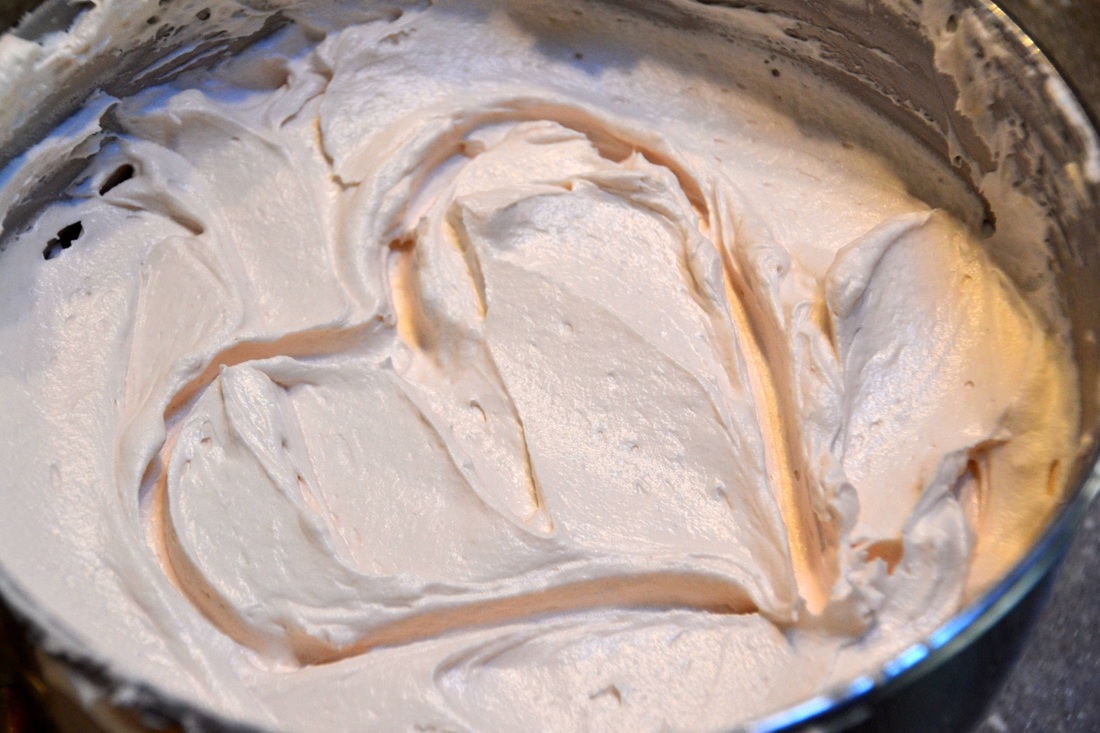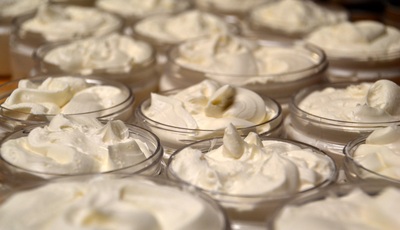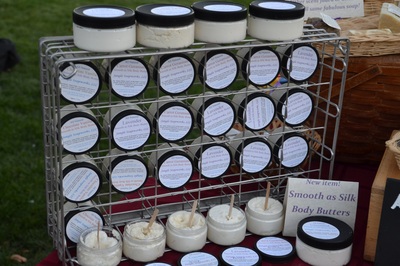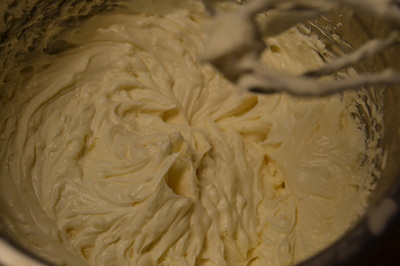|
Actually I really LOVE them, but they have definitely tested my perseverance! I do believe that I possibly have worked harder on perfecting my body butters than on any other product that we make--including soap! So even though I definitely do not "loath" them, they have put me to the test! As with soap, there are so many variables to learn and work with. To start, I decided to make whipped body butters because by using only butters and oils--and NO water or milk--I can still offer a serious moisturizer without the addition of a chemical preservative. Body butters are anhydrous, which means they don’t contain water, so they don’t require preservatives to prevent them from going rancid or growing mold. This is top-of-the-list important to me! My first whipped body butter was a simple shea butter and coconut butter concoction (organic of course!). It whipped up beautifully and was actually rather decadent on the skin. But it was a bit greasy. Some people just don't like greasy, but they still want moisture. I've spent an enormous amount of time researching oils that soak into the skin quickly while lending the greatest possible skin nourishment. Over the following year, I spent lots of time researching the different properties and qualities of the different butters and oils. Here is a bit about some of my favorites: Shea Butter: Shea butter is derived from the seeds of the karite tree. It is very mild and creamy and is used as a great skin softener--it penetrates deep into the epidermis, keeping the skin supple and elastic. It is also a wonderful healing butter with many beneficial properties. The concentration of natural vitamins and fatty acids in shea butter makes it incredibly nourishing and moisturizing for the skin. It is often used to remedy dry skin and to help protect the skin’s natural oils. It is also anti-inflammatory, low comedongenic (does not clog pores) and has a natural SPF of 4. Mango Butter: This is taken from the seed kernel of the fruit of the Mango tree. Mango butter is a very rich creamy butter that doesn't go grainy once melted and is less greasy than some of the other moisturizing butters. It absorbs easily and quickly into the skin. Mango butter has skin softening, soothing and moisturizing properties that help to combat dry skin, eczema and dermatitis. It also offers a natural sunscreen protection against UVB rays and is low comedogenic. Cocoa Butter: Cocoa butter is very hard, almost brittle at room temperature. It is great for trapping in moisture and works as a protective skin barrier. Cocoa Butter contains natural antioxidants and is naturally rich in Vitamin E as well as a number of other vitamins and minerals. Cocoa butter is also a great source of antioxidants, which help combat free radicals and help save your skin from the inevitable signs of aging and environmental stressors. Kokum butter: This naturally white butter has enormously high compositions of beneficial materials to help regenerate tired and worn skin cells and further supports elasticity and general flexibility of the skin wall. Kokum Butter is also well known for it's emollient, and regenerative properties, making it one of the best choices for damaged, dry, and inflamed skin. It has low comedogenic values. Avocado Oil: Avocado oil is rich in antioxidants, making it useful for healing damaged and inflamed skin. Antioxidants like vitamins A, D and E in avocado cause the skin to be suppler, and are thus particularly good for dry or aged skin. Avocado oil applied topically helps relieve dry and itchy skin. Once applied, avocado oil is deeply absorbed by the skin, thus making it an ideal moisturizer and skin care agent. Avocado oil is a low comedogenic oil. Coconut oil: Coconut oil is possibly the best all-in-one natural solution to all your skin problems that could be the answer to chronic skin conditions. Coconut oil is an excellent moisturizer and good anti-inflammatory. It soothes bug bites, speeds healing, helps with rashes, gets rid of flaking skin, softens and shrinks wrinkles, protects against sun damage, acts as an antioxidant to prevent cellular aging, and so much more. Meadowfoam oil: Meadowfoam oil provides good emolliency without being overly greasy and is readily absorbed when applied to the skin. It is also high in vitamin E and antioxidants thus is helpful in reducing the damage that the skin experiences due to exposure to the elements. Meadowfoam oil moisturizes skin as well as protects it from being dehydrated. This is because, unlike water, meadowfoam oil does not evaporate when exposed to the elements. This quality makes it qualify as an ingredient for products that are aimed at preventing acne. It makes it easier for your skin to “breathe” by removing the blockages in the pores. jojoba oil: Contrary to its name, jojoba oil is actually a liquid wax distilled from the seeds of the jojoba plant and used extensively in the cosmetic industry. Jojoba oil is known as the oil (wax) that mostly closely resembles human sebum, so the uses and benefits to skin are high. Jojoba oil is non-greasy and it has anti-inflammatory properties to help you to reduce aging and acne-related problems. The oil is also generally light so it is easily absorbed by the skin, resulting in supple, soft, and moisturized skin. Among other benefits of jojoba oil for skin, are its ability to reduce symptoms of skin infections. Besides possessing anti-inflammatory functions, jojoba oil offers anti-bacterial benefits as well. A combination of those two characteristics helps to reduce various skin problems including eczema and psoriasis. Jojoba oil also contains a substance known as myristic acid which can be used for treating arthritis and rheumatism. It is extremely low in comedogenic values. After much time, trials, and customer feedback, I have chosen the combination and percentages of those oils that best suits most people. Then comes the really tricky part.
Once all the butters and oils have been melted, and the essential oils have been added, the resulting concoction must then be cooled very quickly or else the hard butters can become grainy. Although this graininess doesn't affect the product qualities or moisturizing ability (it still melts nicely into the skin), it is not as smooth and creamy to the user. HOWEVER, it is not good to freeze the oils either. There is a definitely a strategy involved in figuring out the timing just right. It is a dance between the freezer, the beater, the freezer, the beater, etc....until finally the perfect constancy is reached and then the butter is piped into the jars. Recently, our butters have gone through very minor variances in all of these factors, including slight differences in percentages of the different butters and oils used. Please let us know about your experiences with our butters. I hope your skin has found it beneficial along the way!
3 Comments
1/20/2022 03:06:43 pm
Thanks for explaining how body butter can keep your skin young and elastic! My aunt wants to find her soulmate through dating apps, and I want to help her out. Perhaps investing in organic body butter can help give her a more youthful look.
Reply
Leave a Reply. |
JanelleSoapmaker, Homemaker, Mom, Goat milker, Gardener, and Jangly! That's me. :) Archives
May 2020
|
ABOUT US |
SHOPShop is Open!
MORE |
|





 RSS Feed
RSS Feed